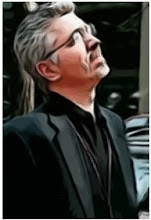
Edgar Lee Masters ( 1868 - 1950) Trained as a lawyer (and a one-time law partner of legal legend, Clarence Darrow), Masters made his literary bones with the publication of Spoon River Anthology (1915). Neither Masters' conceit (a kind of collectively voiced collection) nor his subject matter - - small town American life - - were new. What was new about Masters' collection was the way in which it approached small town life in America on the eve of World War I - - resisting sentimentality while refusing to give in to scorn or cynicism. It was probably this ambivalent stance which helped to create the novel poetic voices that Masters conjured up via his literary seance.
Edwin Arlington Robinson (1869 - 1935). Robinson is one of the most compelling of the "transitional" figures that spanned the close of America's "Victorian" culture and the rise of modernism. He left behind a troubled family and youth in New England to make his literary way in New York City - - one of the earliest exemplars of the "bohemianism" that would come to define Greenwich Village in the American literary consciousness. Until Teddy Roosevelt picked up Robinson's second collection of poems, Robinson was in dire straits. Thanks to the economic stability provided by Roosevelt's patronage, Robinson could continue to write poetry until, eventually, he gained the ear of the American public and literary critics. While apparently straightforward on the surface, like is New England peer, Robert Frost, his poems are complicated - - not so much formally as in tone and stance. Like Frost, Robinson attempts to reckon "modern" experience within more traditional forms and structures. His efforts remain under-appreciated.


